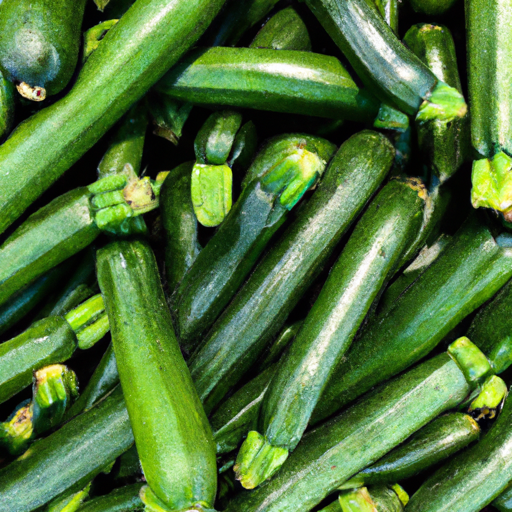Cooking with Baby Zucchinis: A Delicate Delight
If you’re a fan of zucchinis, then you’ll fall head over heels for their adorable counterpart – baby zucchinis. These petite vegetables may be small in size, but they pack a punch when it comes to flavor, versatility, and nutritional value. In this blog post, we’ll explore all things baby zucchinis, including their taste, common uses in cooking, nutritional benefits, and some interesting facts. Let’s dive in!
Taste and Texture
Baby zucchinis are known for their delicate flavor and tender texture. They possess a mild, slightly sweet taste with a hint of nuttiness. When cooked, they maintain their firmness while developing a smooth and creamy texture. This combination of flavors and textures makes them a delightful addition to various recipes.
Common Uses in Cooking
There are countless ways to incorporate baby zucchinis into your culinary creations. They can be enjoyed raw, sliced and added to salads for a fresh crunch. Alternatively, they can be sautéed, roasted, grilled, or even pickled for added depth of flavor. Their small size and thin skin make them quick to cook, making them a convenient choice for busy home cooks.
Baby zucchinis are a fantastic companion in pasta dishes, where they can be sliced into thin ribbons or cubed to add a burst of color and a subtle vegetable flavor. Additionally, they lend themselves well to stir-fries, vegetable skewers, frittatas, and even as a stuffing for other vegetables. The possibilities are truly endless!
Nutritional Value
In addition to their delectable taste and culinary flexibility, baby zucchinis offer an array of health benefits. They are low in calories and fat, making them a perfect ally for weight-conscious individuals. These miniature vegetables are also a great source of dietary fiber, which aids in digestion and supports overall gut health.
Furthermore, baby zucchinis pack a nutritional punch, providing essential vitamins and minerals such as vitamin C, vitamin A, potassium, and manganese. These nutrients contribute to boosting the immune system, promoting healthy vision, maintaining healthy blood pressure levels, and supporting bone health. All of this goodness makes baby zucchinis a worthwhile addition to any well-balanced diet.
Interesting Facts
Now, let’s explore some intriguing facts about baby zucchinis:
- Baby zucchinis are simply immature zucchinis, picked before they reach their full size.
- They are often harvested when they are about 4 to 6 inches long, depending on the desired maturity level.
- Baby zucchinis are more tender and sweeter compared to their fully grown counterparts.
- Unlike other vegetables, baby zucchinis have a thin and delicate skin, which means there’s no need to peel them before cooking.
- Zucchinis, including their babies, belong to the summer squash family and are native to Central and South America.
Conclusion
Baby zucchinis are a delightful addition to any kitchen. With their delicate flavor, versatility in cooking, and impressive nutritional profile, they offer a unique spin on the ever-popular zucchini. Whether enjoyed raw, sautéed, or incorporated into various recipes, these petite veggies are bound to elevate any dish. So next time you spot these miniature marvels at the grocery store or farmer’s market, grab a handful and embark on a culinary adventure with baby zucchinis as your trusty sidekicks!
Interesting Facts About Baby Zucchinis
- Origin: Baby zucchinis, also known as courgettes, have their origins in Central and South America. They were likely brought to Europe by Christopher Columbus during his explorations in the 15th century.
- Common Uses: Baby zucchinis are versatile and can be enjoyed raw or cooked. They are commonly used in salads, stir-fries, soups, stews, and grilled dishes. They have a mild flavor that pairs well with a variety of ingredients.
- Nutritional Benefits: Baby zucchinis are low in calories and are a good source of vitamins A and C. They also provide important minerals like potassium and manganese. Additionally, they are rich in dietary fiber and antioxidants, which help promote a healthy digestive system and may reduce the risk of chronic diseases.
- Unique Properties: Baby zucchinis are tender and have a delicate texture compared to fully grown zucchinis. They are typically harvested when they are about 3-4 inches long and have a thin skin that does not require peeling. Unlike their mature counterparts, they have a subtler flavor and a higher content of water, making them ideal for quick cooking methods.
- Historical Significance: Zucchinis have been cultivated for thousands of years, with records of their cultivation traced back to ancient civilizations such as the Aztecs and Incas. However, the modern variety of baby zucchinis, which are a smaller and more tender version, has gained popularity relatively recently, appearing in culinary circles in the late 20th century.




Use the share button below if you liked it.
It makes me smile, when I see it.